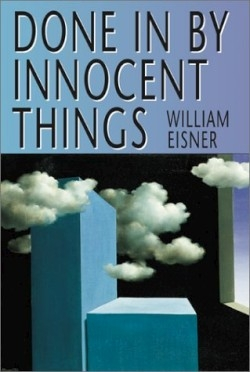Done In By Innocent Things
“Pollen, dust, animals, all these make me sneeze. I am
done in by innocent things,” says a father who will never support his family, in the cleverly constructed short story “An Afternoon at the Movies.” His son imagines a film of his parents’ courtship and is “appalled” at the lies his father tells to his soon-to-be-long-suffering wife. The story has all of the author’s raw materials: humor, anguish, compassion, and a character’s over-wrought sense of fate. Eisner brings them to bear often as he considers human nature in this collection of twelve stories and one novella.
Many innocent things appear in these pieces: a box of old love letters in “Arthur,” a chafed wire in “The Baby Rocker,” a poorly scheduled sales pitch in “Rainstorm,” rejuvenating vaginal fluid in “Fountain of Youth.” Each is also potentially ruinous; how they are used makes the difference. The same is true of the characters. A description of a bullet in “Heist” applies to the (mostly first-person) narrators: they are “both deadly and innocent, beyond praise or blame.”
In Eisner’s world, characters entrap and delude themselves as they plot, or stumble, through plans to cure their own spiritual disease. They want to rob banks or sleep with their bosses or get to the meeting that carries the weight of their future in spite of the accident on the wet lonely road they’re traveling. They have “intimations of [their] own decline.” They discover that although they are featured in life, they may not be stars. It is a small business vision. People are pawns in a larger elusive picture; they hunger and obstinately hang on to their very human desires. Less than heroic, they feel very close.
This is Eisner’s second book; his first novel, The Sevigne Letters, appeared in 1994. Like many of his characters, he began his working life as an engineer, and became a CEO. His experience lends authenticity to the ethical dilemmas and spiritual quandaries that his characters confront.
If Eisner missteps in his writing, it is sometimes to mistrust himself. A story lasts a paragraph too long, as he explains what he already has skillfully shown. Women are more catalyst than characters; only one narrates, despite the universal nature of the stories’ situations. He also will mention a character’s race, if it’s brown or black, however irrelevant to the plot. It’s a habit to check. These quibbles do not undermine the compassion that marks this collection.
Disclosure: This article is not an endorsement, but a review. The publisher of this book provided free copies of the book to have their book reviewed by a professional reviewer. No fee was paid by the publisher for this review. Foreword Reviews only recommends books that we love. Foreword Magazine, Inc. is disclosing this in accordance with the Federal Trade Commission’s 16 CFR, Part 255.

